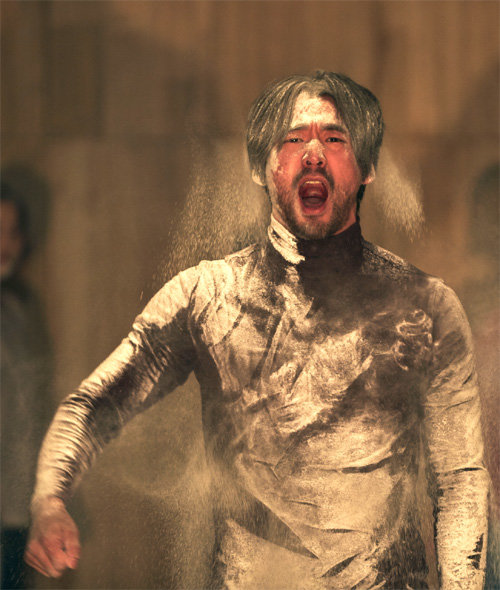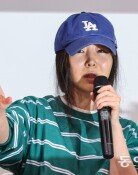Novel Human Acts adapted into a theatre play
Novel Human Acts adapted into a theatre play
Posted November. 15, 2019 07:53,
Updated November. 15, 2019 07:53

“What is a human? What should we do to stop a human becoming a what.”
Set against a gigantic wood wall, the stage is empty. A deafening roar instantly sends the time and space into disarray. Actors shout out the lines from a novel, and hurl bags of wheat powder like teargas and get covered in it. They repeat the poses hard to describe in words and run against the wall, unafraid to hurt themselves. Behind the actors rolling on the stage on all fours is the fitful thud of piano keys.
“Human Fuga” is a play that brings life to the lines of the “Human Acts,” a novel penned by South Korean female author Han Kang, through the medium of bodies and objets. This is the first Korean theatre play adapted from a novel. It takes on an omnibus structure built around “Dong-ho,” a 15-year-old boy killed in mass oppression shooting by martial law army in Gwangju in May 1980, and the characters surrounding him. Fuga is a method of songwriting where the melody is repeated and mixed before entering the phases of imitation and variation. The title is a metaphor that the pain of the 1980 tragedy is still being relived in different forms in many lives of today.
The play is far from kind to its audience. The convoluted story will likely leave you perplexed. An unexpected incident occurs in place of a consistent narrative, before giving way to agony and objet. Even with the original novel in hand, it would be challenging to follow the 35 different movements of actors, live fuga performance, and lines that resemble testimonies closely enough. If an inexplicable sense of discomfort is felt among the audience, it would be a success for both the author and the director whose goal is to “let one squarely face the sound of pain.”
pep@donga.com
Headline News
- Med professors announce intention to leave hospitals starting Thursday
- Bridge honoring Sgt. Moon Jae-sik unveiled in Pennsylvania
- Chief of Staff Chung tells presidential secretaries to stay away from politics
- US FTC bans noncompete agreements
- N. Korea launches cyberattacks on S. Korea's defense companies







